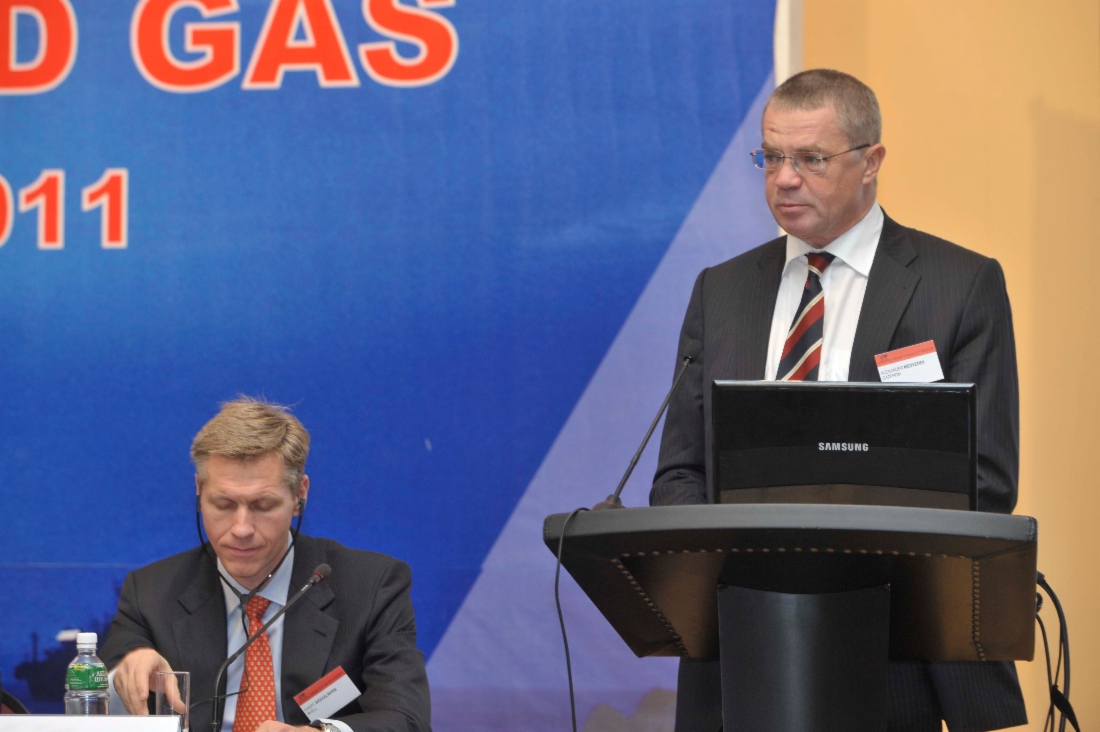Alexander Medvedev: Russian natural gas will become key commodity in Asian-Pacific energy market
RELEASE
Release
Yuzhno-Sakhalinsk hosted the opening of the 15th Sakhalin Oil and Gas 2011 International Conference. Gazprom's delegation led by Alexander Medvedev, Deputy Chairman of the Company's Management Committee is taking part in the Conference. Alexander Medvedev delivered a speech entitled “The Growing Role of Natural Gas and Asian-Pacific Region”.
Alexander Medvedev highlighted that the coming decades offer excellent opportunities for the gas industry development amid the growing energy demand worldwide – the “gas century” is coming.
This is conditioned by a gradual depletion of oil reserves and the potential need to significantly increase oil production investments. Being much cheaper today than oil in terms of calorific capacity, natural gas attracts greater attention especially under the current conditions marked by the global economic instability. Rapid socioeconomic development of the Asian-Pacific region strongly influences gas consumption rates as well.
The speaker stated that a change of attitude to nuclear energy in many countries after the Japanese disaster also leads to the inevitable expansion of the natural gas share in the global energy mix. Finally, natural gas as the most environmentally clean fossil fuel is the best energy resource in the context of the current policy designed to reduce atmospheric emissions of carbon dioxide. Even today natural gas defies oil in the vehicle fuel market.
Thus, we may confidently state now that utilization of natural gas with its optimal balance of price, quality and environmental indicators will secure sustained development of the global energy sector.
In this respect Alexander Medvedev highlighted that Gazprom, the world's largest gas company, was a reliable natural gas supplier and had the necessary potential – from technologies to manpower and financial resources – for supplying efficiently not only the European, but also the Asian markets.
Gazprom owns the world's largest reserves of this type of fuel ensuring their continuous replenishment above the production rates. The year of 2010 alone showed a 547.7 billion cubic meter increase in gas reserves through geological exploration that exceeds gas production by nearly 40 billion cubic meters. The Company is intensely upgrading and building new gas production and transmission facilities, diversifies supply routes and final products.
Alexander Medvedev noted that despite the heated debates of the European community on the risks of dependence on the Russian natural gas, Gazprom was the company that frequently offered help when energy supply interruptions occurred. For instance, the Company recurrently fulfilled Turkey's requests for extra gas during the stoppage of gas supply from Iran. After the disaster at the Fukushima nuclear plant, the Company supplied Japan with extra 325 thousand tons of liquefied natural gas (LNG). Gazprom is going to follow the situation and provide possible assistance to Japan in mitigating the disaster results. This year's halt in gas supply from Libya to Italy was almost fully offset by the Russian gas.
The speaker underlined that the events taking place in a number of Middle Eastern and North African countries stricken by protest movements and acute internal conflicts including armed hostilities, are yet another proof that it is important to guarantee reliable, uninterrupted and sustained supplies of gas and other energies to international markets.
According to Alexander Medvedev, Europe remains the top-priority gas sales market for Gazprom. The Company diversifies gas export routes to consumers in the European Union. The Nord Stream and South Stream projects are progressing successfully.
“At the same time, the eastern direction is becoming extremely attractive for developing Gazprom's gas business. The scope of the Company's projects in the Far East is so great that South Stream may be considered a medium-cost project in comparison with that. The growing gas demand in Eastern Russia and Asian countries will enable the Company to advance its trade to the global level and reduce dependence on certain customers,” underlined Alexander Medvedev.
For instance, the Chinese market of natural gas has a high development potential. By 2030, China's gas demand is expected to surpass the European indicators. That offers quite tangible prospects for Russian gas supplies even if China achieves success in shale gas production. Currently, Gazprom is engaged in arranging pipeline gas export via two supply corridors with a total capacity of up to 68 billion cubic meters. “The negotiating process is long and hard, but we have achieved a significant progress. A purchase and sale gas contract may be sighed with China before the end of 2011. After the signing, we may launch construction of necessary transportation capacities and start supplies in late 2015,” said Alexander Medvedev.
In general, Gazprom forecasts to capture a 30 per cent share of the European market and nearly 13 per cent in the Northeast Asian market by 2030. At that, by the end of the period under review, Gazprom Group's LNG segment will reach some 14 per cent worldwide.
LNG projects will help Gazprom expand the range of new available markets and significantly raise its export. In this context, the Company is studying possible development of LNG capacities in the Far East while paying great attention to the Shtokman field development project. Besides, Gazprom considers it necessary to concentrate its efforts on new potential LNG consumers and considers Asia, the Middle East and Latin America as such.
“We are confident that in the long run Russian natural gas will have a share in the global market and, in particular, in the Asian-Pacific market to be its top-priority commodity,” said Alexander Medvedev in conclusion.
Background
The 15th Sakhalin Oil and Gas 2011 International Conference lasts from September 27 to September 29. The Conference brings together some 500 heads and experts from world's leading oil and gas companies, representatives of executive and legislative authorities, scientists from Russia, China, the Netherlands, the UK, France, the USA, South Korea, Japan and others.


